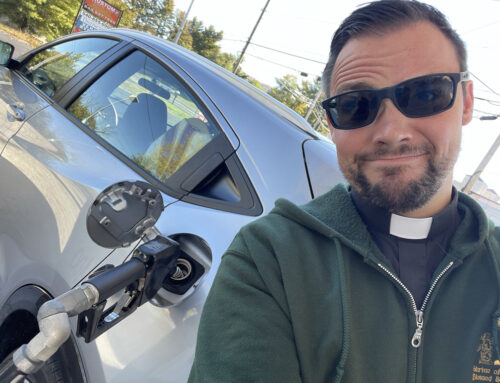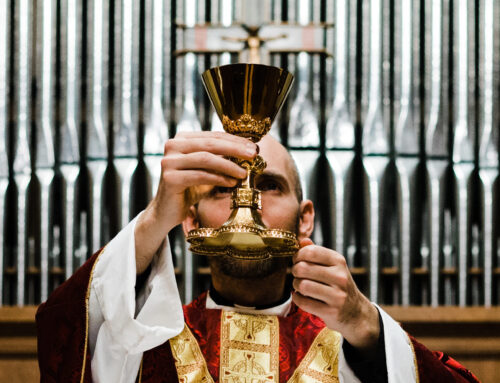Somedays just feel like drowning.
Yesterday was one of those days for me. Between homily writing, setting up for a huge wedding, running late for a long confession line, having no altar servers and nobody to set up for mass for the 5:30 mass, and so many other little questions and problems along the way… I felt like I was literally drowning.
I’m sure you all can relate to this feeling, too. Responsibilities at work, mountains of homework for school, conflicts and situations in the family, problems with relationships, fights with your husband or with your wife, financial uncertainties, stress here — stress there.
Sometimes… it all just feels like you’re drowning.
Then we look at the world around us. And let’s be honest — that looks like it’s drowning too, doesn’t it?
So much seems unhinged.
Those images we saw this past week of rioters breaking into our nation’s Capitol building were so scary, so disturbing to us — because it looked as if the country we all love, the country so many souls have fought for and died to defend — is drowning… drowning in division, selfishness, and bitterness from every side!
One scroll through social media these past few days is enough to make you feel totally inundated. Censorship and mean-spirited comments, dismissive and holier-than-thou declarations, flattening, canceling, tearing apart. Factions and rivalry running amok… Regardless of your political leanings, ALL of it is overwhelming and NONE of it is of God. The Devil feasts on dividing and isolating us… tearing us apart and separating us.
It feels like we’re drowning.
Perhaps given all of this, it is fitting that the Church meditates today on the Baptism of the Lord.
Because Baptism looks like drowning.
In fact, it’s supposed to look like drowning.
In the early Church, catechumens who presented themselves for baptism and professed the faith of the Church, were literally dunked under the waters, totally immersed three times, proclaiming their belief in the thrice holy God — Father, Son, and the Holy Spirit.
This sacramental ritual was meant to both visibly symbolize and effect the destructive and cleansing realities of God’s invisible grace. These new believers were being plunged into the very Crucifixion and Death of Christ Himself. It was meant to feel like they were dying, because something in them really was dying. Original sin was dying. The Old Man was dying. Their former way of life was dying. Their previous sins were dying.
So when they were lifted back up, out of the waters — out of death! Out of the tomb! — They were filled again with air, filled with Resurrection and the Holy Spirit Himself!
That’s how Christians have always been born — By entering into the drowning waters of Baptism, and then coming back up again — fully alive, filled with the Holy Spirt.
One Church Father, St. Cyril of Jerusalem, said that the baptismal font was both our “tomb and our mother.” It’s both death and life. It’s both a drowning, and a saving. Noah’s flood is fulfilled and transformed: The waters of destruction become our birthplace. After Baptism — after this near drowning — we are dead to sin and alive to God. Our priorities are brand new, because we are brand new. Anyone who is in Christ — that is, baptized into Him, says St. Paul — is now a “new creation.”
This is important, because though we all might feel like we’re drowning right now — we can have bold, unyielding hope. We can have courage. Because in a certain real and sacramental way:
We, Christians, have already been drowned. We’re already dead!
If that’s true: Then what do we have to be afraid of? If God is for us, who can stand against us?
What can this world do to us?
We’re already drowned and already raised in Jesus Christ. Believing in this fact, we can turn to the Lord, trusting totally in Him, and face today’s inundation, today’s deluge of error, division, and hatred with love. With peace. With the firm conviction to preach the Gospel of healing and conversion into the swirling waters.
We have to be careful, though. Because anytime we feel like we’re drowning — when we’re flustered or when we feel like everything is being taken from us — there will be a very strong temptation:
The temptation to lash out. To violently overreact. To pull everyone and everything else down into the waters with us. To refuse to listen to anyone except our own opinion, our own ideas. To drown the whole world if we can!
Ask any lifeguard and they’ll tell you that saving a drowning person is dangerous and requires careful technique, because the person’s natural, desperate reflex is to pull the lifeguard down along with them.
Be on your guard! This can happen with politics, in our families, in our friendships… everywhere…
So how do we resist this temptation?
My suggestion is that we all look to the Lord Jesus.
Jesus doesn’t lash out. He doesn’t thrash about, pulling others down. No — He humbly submits to the drowning waters of baptism. He identifies himself with sinful humanity. He lowers himself.
Jesus did not need baptism, of course. He is without sin. In Matthew’s version of the story, John the Baptist is fully aware of how outlandish, how strange this situation truly is. John tries to prevent Jesus from submitting, saying “I need to be baptized by you, and yet you are coming to me?”
Jesus responds, again, in total obedience to the Father: “Allow it now, for thus it is fitting for us to fulfill all righteousness.”
A spectator may look at all this and think: What’s wrong with Jesus? Why is he submitting to this insult? He’s better than this! He’s stronger than this! He doesn’t need forgiveness!
Yes, that’s quite true. And yet, Jesus is showing us by personal example, that he is free enough to abandon Himself to God… He’s free enough to love and obey God alone. And so he slips beneath the water for us and with us.
And our Father in Heaven answers with deep, eternal approval:
“You are my beloved Son. With you I am well pleased.”
Long before that amazing moment, the prophet Isaiah prophesied about the Messiah, saying: “Here is my servant, whom I uphold, my chosen one in whom I delight. He will not shout or cry out, or raise his voice in the streets. A bruised reed he will not break, and a smoldering wick he will not snuff out.”
“… I will put my Spirit on him, and he will bring justice to the nations.”
Not in shouting, not in violence, not in domination… but in complete, loving surrender.
Only by entering fully INTO the deluge, into the drowning waters, does Jesus bring about victory and peace. Only by hanging on a Cross can Jesus effect the salvation we all are being invited to share in.
THAT’s how God brings about justice to the nations.
If you think that’s too weak for you… If you think surrendering and dying is not a good enough tactic for real, lasting victory — then I’m sorry, but you are an obstacle to the Lord. You are not thinking as God does, but as human beings do. And I encourage you to repent, and draw near to the Lord of all humility, and start really listening to HIM.
“For my thoughts are not your thoughts,
nor are your ways my ways, says the LORD.”
But surrendering doesn’t mean becoming a doormat that everyone can then walk all over. Far from it…
Was Maximillian Kolbe a doormat when he offered to die in place of another condemned man in a Nazi concentration camp? No. Was Mother Teresa a doormat when, after begging for bread and getting spit directly in the face, responded: “Thank you, sir, that was for me… Now what can you give the poor?” No! Was Saint Stephen a doormat when he was praying the angry people who were literally pelting him with rocks? No! Was Jesus a doormat when he turned himself in to the temple guards in the Garden of Gethsemane, calmly saying: “I am he.” No, of course he’s not a doormat.
Remember: At those words of surrender, those words of apparent weakness, the soldiers fell tumbling back to the ground. They were knocked down by the strength of Christ’s weakness.
That’s what real power looks like. It looks like total confidence in God… not in flags, votes, machine guns, and senate seats.
It looks like Jesus, laying down His life.
My fellow Christians, are we going to listen to the world’s tactics or to God’s? That’s ultimate the question that will determine the fate of our eternal destiny. “The gate is wide and the road broad that leads to destruction — how narrow the gate and constricted the road that leads to life.” Choose life. Listen to our God who desires to speak over each one of us at the end of our lives with these words: “You are my beloved Son, my beloved daughter, in whom I am well pleased.”
But I’ll warn you: Listening to God will look like weakness. It will not look like strength. It often won’t look like “winning” according to worldly standards.
More likely, it will look and feel like drowning.
But Jesus leads the way. He goes down into the waters first. He’s with us in our suffering.
Are we weak enough to remain with Him?





Wow! Father Anthony, you hit the nail on the head! What a timely, inspiring article! Thank you so much!’
[…] we forget in this life is—as my parochial vicar Fr. Anthony Ferguson put it in his homily this past weekend—“the Christian life often looks like losing.” The Cross is “folly” and […]